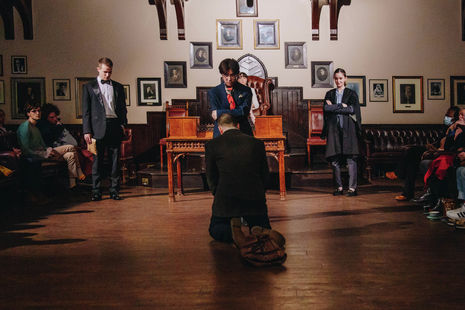The Merchant of Venice is timely and ambitious
Theatre Editor Georgina Hayward reviews The Merchant of Venice at the Cambridge Union

It’s the first time in recent history that a play has been staged at the Cambridge Union chamber. In this production of Shakespeare’s ever-polarising The Merchant of Venice, characters casually throw out anti-Semitic remarks while pacing the arena that has been at the heart of Cambridge debate and discourse since 1815. The choice of venue is bold, and has the potential to open up a discussion regarding free speech and civil debate. While this production stumbles at points in the execution of its ambitions, it certainly sparks a conversation that could not be more relevant to students today.
“Has the potential to open up a discussion regarding free speech and civil debate”
The Merchant of Venice is a task and a half for any creative team. Depending on who you ask, Shakespeare’s Shylock can be anything from a checklist of anti-Semitic stereotypes to a self-aware critique of anti-Semitism in all its forms. This production does not shy away from the questions provoked by the difficult material. Considering that the Cambridge Union is often scrutinised for platforming out-of-touch ideas and attitudes, this particular production has the potential to be especially poignant.
Directors Georgia Adams, Tom Runciman and Ben Phillips make some nice uses of the venue. Bar Shylock, characters dress in formal black tie and gowns, much like the speakers at the weekly Cambridge Union debates. Costume designer Annie Ma dresses Shylock in an unassuming grey jumper that makes him the odd one out amongst the Christian characters in their formal attire. At various points, characters in positions of power lounge in the brown leather chair at the back of the chamber, where the CU President would usually preside over and moderate weekly debates. These thoughtful touches come to a climax at the end of the play, when Shylock watches from the balcony as the other characters receive their happy endings.
Though the choice of the CU chamber as a venue certainly brings out some interesting moments, it does present some problems for the cast, whose voices are at times too quiet for those in the back seats. In the large chamber, the subtleties of a naturalistic acting style are lost. Having said that, the cast and directors get to grips with a text that asks a lot from them, delivering clear characterisations. Portia, played by Gwynn Horbury, comes across as a smug and savvy rich kid. Sawen Ali’s Antonio is tragic and exhausted. Most of the Christian characters are played with the swagger and presumption not unlike that of the frequently wine-drunk speakers at the CU.
The stand-out performance comes from Sol Alberman as Shylock, who performs the pivotal role with moving sincerity and humanity. His Shylock is relatable – a practical businessman, worn-down by the world’s injustices. He anchors the performance with considerable stage presence.
“Might set a trend for similarly self-aware productions at the CU in the future”
Transitions between scenes are smoothly executed with the help of a live string band, led by musical director James Rosser. The music, composed by Jonathan Whiting, provides a lovely atmosphere that matches the sophisticated air given to the production by the venue’s stately chandeliers and leather seats.
Ultimately, the show gestures towards some interesting ideas, but the concluding point that it makes about the Cambridge Union (and institutions like it) feels half-formed. However, the creative team makes a few inventive, thought-provoking choices, and they may set a trend for similarly self-aware productions at the CU in the future.
The Merchant of Venice is playing at the Cambridge Union chamber on Saturday 19th February at 2pm and 7:30pm, Sunday at 7:30pm and Monday at 7:30pm.
 News / Colleges charge different rents for the same Castle Street accommodation2 March 2026
News / Colleges charge different rents for the same Castle Street accommodation2 March 2026 News / King’s hosts open iftar for Ramadan3 March 2026
News / King’s hosts open iftar for Ramadan3 March 2026 Theatre / Lunatics and leisure centres 4 March 2026
Theatre / Lunatics and leisure centres 4 March 2026 News / Angela Merkel among Cambridge honorary degree nominees27 February 2026
News / Angela Merkel among Cambridge honorary degree nominees27 February 2026 News / News in Brief: waterworks, wine woes, and workplace wins 1 March 2026
News / News in Brief: waterworks, wine woes, and workplace wins 1 March 2026








